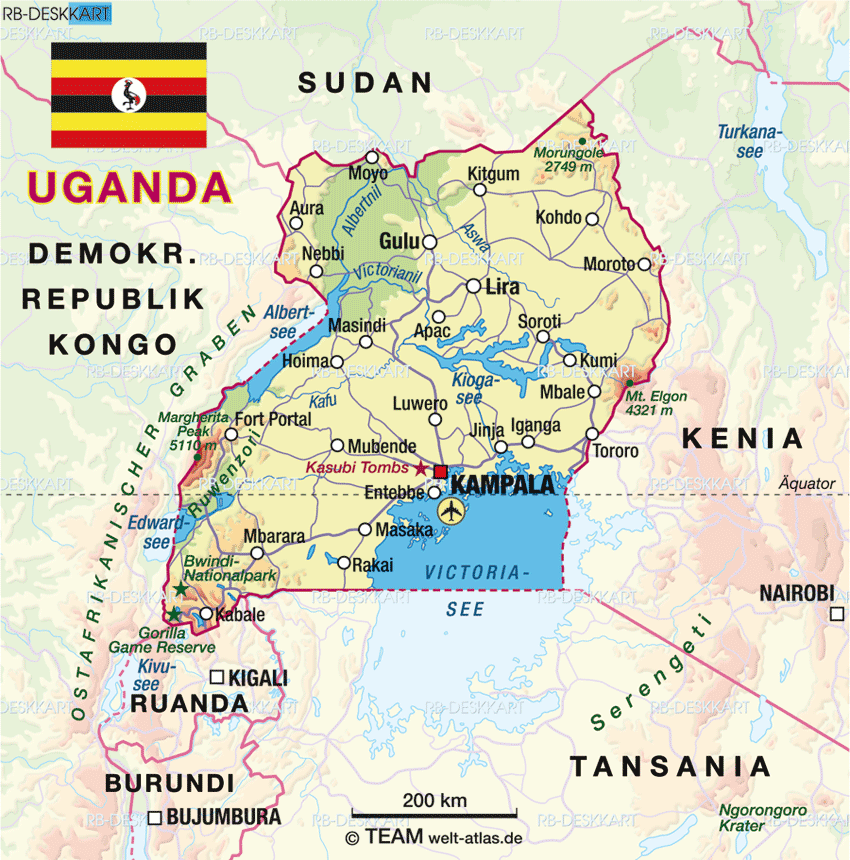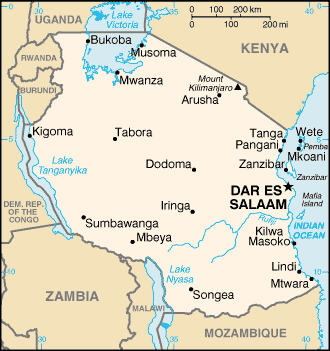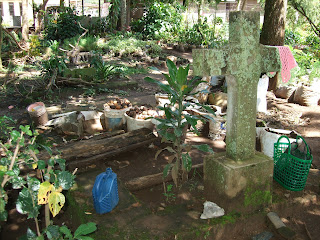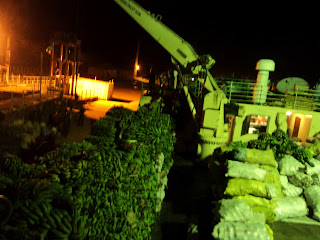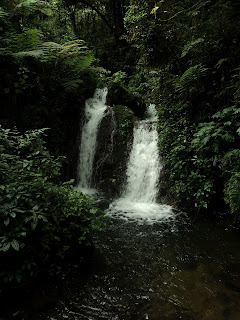The Ministry of Education is currently running a seminar at the college for area secondary school teachers in order to try to get them to integrate technology into their classrooms. As part of this, every teacher who shows up is given a laptop and a USB modem. Each secondary school receives a projector and a screen for it.
Much as I am not a fan of technology for its own sake, which is what this sounds like, I might cautiously opine that this could be a good idea. Giving the computers to the teachers avoids many problems of giving computers to the school as a lab, i.e., failure of anyone to perform any maintenance ever leaving the lab a virus-riddled wreck of broken electronics, and on the off-chance of any computers remaining operational, the teachers have a tendency to hog the lab and not let students use the computers. Furthermore, if the whole projector thing works out, that would be great for teaching. It is fashionable for Americans to speak of the absolute corruption of power point, but in a classroom with 60-100 kids such that the kids in the back can't see the chalkboard well, assuming the chalkboard is even in any shape to be written on, which is not guaranteed, and the teacher has both chalk and an eraser, power point does seem the easiest solution, assuming the classroom has an outlet and there is electricity that day.
Furthermore, having internet access might actually help the teachers to access more and more factual material for teaching. Textbooks are quite often scarce and more often terrible, and while, if my students are any examples of the teachers of the future, there isn't any good sense of credible vs. non-credible sources of information, at least they all really like Wikipedia. I hate saying this, and I might hate myself for saying this, but information from Wikipedia isn't going to be any worse than information from the textbooks they have now, might in many cases be better, and will certainly be more comprehensive.
Being a Stirring Account of adventures in Tanzania of a Blood and Thunder nature tinged with a Hue of Drama and a side of Angsty Flashbacks. Sponsored by the Peace Corps, in whose service I am making the world a Better Place.
I'm done with Peace Corps. I am now spending a month as a corporate sellout in China. It's a long story.
Disclaimer
The content of this blog does not reflect the positions of the Peace Corps and is solely the responsibility of the author.
Have I Mentioned Recently that Intellectual Credibility is Doomed?
This news from Louisiana. I get so embarrassed when people here tell me they want to send their children to the US to study, because, well, umm, and also holy racism, Batman. Who is himself white.
Stories of Murder: Dead Babies
As told to me from a volunteer in a village near Iringa:
"""
When I got to school in the morning as usual to teach, some of the other teachers came to me and said 'we have a situation.' They took me to the school's social club, essentially a bar, and showed me the choo[toilet]. It was a pit latrine, so you could just look down it. There was a dead newborn baby floating there. The teachers said to me, 'you teach biology, what can you do about this?'* So I had all the pregnant ladies in the village come to the school, and the lady who had been pregnant but now wasn't confessed. It turned out that she had had this baby with a man not her husband, and her husband, who didn't live in the village, was coming home soon. There isn't a police station in my village, we had to call the next village over. Their police have a vehicle, but no money for gas. I ended up paying for gas out of my own money so the police could come. The lady ended up convicted and sentenced to life in prison, but she paid off the police and is back in the village.
"""
*There are less qualified people to ask in this situation.
"""
When I got to school in the morning as usual to teach, some of the other teachers came to me and said 'we have a situation.' They took me to the school's social club, essentially a bar, and showed me the choo[toilet]. It was a pit latrine, so you could just look down it. There was a dead newborn baby floating there. The teachers said to me, 'you teach biology, what can you do about this?'* So I had all the pregnant ladies in the village come to the school, and the lady who had been pregnant but now wasn't confessed. It turned out that she had had this baby with a man not her husband, and her husband, who didn't live in the village, was coming home soon. There isn't a police station in my village, we had to call the next village over. Their police have a vehicle, but no money for gas. I ended up paying for gas out of my own money so the police could come. The lady ended up convicted and sentenced to life in prison, but she paid off the police and is back in the village.
"""
*There are less qualified people to ask in this situation.
In Which I Ponder the Non-Appeal of the Tanzanian Underdog
Psychologist types like to conclude that Americans like underdogs, a thesis easily supportable by every sports movie ever made. Though when it comes to team sports, Americans mostly select teams based on regionalism.
Tanzanian sports don't work on either principle. Football, by which I mean that sport which Americans call soccer, is a national pastime. The most important teams to follow, however, aren't the African teams, but the Premier League teams in England. It is harder in the markets to find a Tanzanian football jersey than a Chelsea jersey. There are some football clubs that play against one another in Tanzania, and I should probably know more about them than I do, given that one of the country's nicer stadiums is here in Morogoro, but all I know is that the teams people talk about playing one another are Simba and Yanga. People root for whichever one has been winning recently. Likewise the Premier League teams. The team to support is the team that wins, not the one that struggles against overwhelming odds. A friend of mine has a good hypothesis, with which I agree, that in a land traditionally seriously oppressed and currently struggling with poverty and a lack of infrastructure and a place in world news that can be summed up as "wartorn poverty-stricken AIDS-riddled" (because reporting with any nuance or lack of sensationalism would be, like, work) people want to identify with the powerful and successful because, well, power and success are good, and when you don't have it, you want it. Naturally.
This would explain why people not in England care about English football clubs, which I admit that, as an American, I find almost incomprehensible. It might also explain why the majority of Tanzanians identify as either Christian or Muslim, despite being introduced to both religions when the Muslims were selling them to the Christians as slaves, which would seem to a be a great reason for embracing neither.
Even in America, outside the demographic of people who answer surveys, there do seem to be some instances, of people living below the poverty line selecting sports teams outside the American norm of regionalism. And by some instances, I mean I know of one instance as a friend of mine told me that in West Baltimore on the matter of baseball, a lot of people support the Yankees rather than the Orioles, and the Yankees do represent a lot more winningness than the Orioles.
Thoughts, friends?
Tanzanian sports don't work on either principle. Football, by which I mean that sport which Americans call soccer, is a national pastime. The most important teams to follow, however, aren't the African teams, but the Premier League teams in England. It is harder in the markets to find a Tanzanian football jersey than a Chelsea jersey. There are some football clubs that play against one another in Tanzania, and I should probably know more about them than I do, given that one of the country's nicer stadiums is here in Morogoro, but all I know is that the teams people talk about playing one another are Simba and Yanga. People root for whichever one has been winning recently. Likewise the Premier League teams. The team to support is the team that wins, not the one that struggles against overwhelming odds. A friend of mine has a good hypothesis, with which I agree, that in a land traditionally seriously oppressed and currently struggling with poverty and a lack of infrastructure and a place in world news that can be summed up as "wartorn poverty-stricken AIDS-riddled" (because reporting with any nuance or lack of sensationalism would be, like, work) people want to identify with the powerful and successful because, well, power and success are good, and when you don't have it, you want it. Naturally.
This would explain why people not in England care about English football clubs, which I admit that, as an American, I find almost incomprehensible. It might also explain why the majority of Tanzanians identify as either Christian or Muslim, despite being introduced to both religions when the Muslims were selling them to the Christians as slaves, which would seem to a be a great reason for embracing neither.
Even in America, outside the demographic of people who answer surveys, there do seem to be some instances, of people living below the poverty line selecting sports teams outside the American norm of regionalism. And by some instances, I mean I know of one instance as a friend of mine told me that in West Baltimore on the matter of baseball, a lot of people support the Yankees rather than the Orioles, and the Yankees do represent a lot more winningness than the Orioles.
Thoughts, friends?
Realization
The official Tanzanian ICT textbook from which I am supposed to be teaching cites Wikipedia for a lot of its material. My job is futile, intellectual credibility is doomed, and I'm going to go beat my head against a wall and cry.
Voyage of the Peace Corps: The Journey Home
Before leaving Uganda for good and all, we stopped at Kabale, recommended of guidebooks for the lovely Lake Bunyoni and the general nice nature of the town.
And being at that point as we were largely out of Ugandan currency, we begged lifts out of various people and were able to make it back to the Tanzanian border on approximately US $8 between the four of us. So we could have gone to the bank, but foreign bank fees and also where's the fun in that?
We spend a night in Bukoba back where we could access our own banks and get our Peace Corps salary. Bukoba is a fun little town, which includes a bizarrely out of place and never-finished-due-to-lack-of-funds ostentatious cathedral. Also, a German cemetery built in 1912, right across from a hotel in which Humphrey Bogart and Katherine Hepburn stayed while filming African Queen. Part of the cemetery is now taken up by some mama's tree nursery, but there are worse things to do with a forgotten grave than use it to raise avocados.
And there was a nice beach with brown sand where we spent a ridiculous amount of time just sitting, before taking a passenger ferry full of bananas back to Mwanza.
Mwanza, we played on rocks more and went to the very odd museum of animal legs made into items of furniture. The museum also featured inexpertly taxidermied birds with molting feathers that had been stuck back on haphazardly. It was quite droll, really.
Then we took a fourteen hour bus ride home. Fin.
Viewing of Lake Bunyoni was not so nice as expected due to the many many swanky resorts which had erected high fences so that to get a good view of the lake would be difficult without paying money. Well played, resorts. Nonetheless, by dint of a little walking we found ourselves at a non-fenced primary school, billing itself as the "little angels" school. The titular small and angelic children were by and large annoying and snotty, but by some yelling at them not to touch, we managed to sit relatively undisturbed on a hill top watching the lake and the sheep. The children were given to repeating things we said, so we taught them to say "child slavery" with great enthusiasm. Normally, we would tell them to stay in school and always use condoms, but we were on vacation. We didn't feel obligated to build any capacity or teach any life skills.
We did stay at a neat little guesthouse, which had a very nappable loft area, and also a tiny cultural museum--a replica hut with replica stuff in it, including replica shrine. For those staying at the guesthouse, there was a free tour conducted by the bouncily enthusiastic staff member Bonny, who was completely and in all ways fabulous.
 |
| Thatch umbrella that leaves hands free! |
 |
| Bonny in the shrine |
And being at that point as we were largely out of Ugandan currency, we begged lifts out of various people and were able to make it back to the Tanzanian border on approximately US $8 between the four of us. So we could have gone to the bank, but foreign bank fees and also where's the fun in that?
We spend a night in Bukoba back where we could access our own banks and get our Peace Corps salary. Bukoba is a fun little town, which includes a bizarrely out of place and never-finished-due-to-lack-of-funds ostentatious cathedral. Also, a German cemetery built in 1912, right across from a hotel in which Humphrey Bogart and Katherine Hepburn stayed while filming African Queen. Part of the cemetery is now taken up by some mama's tree nursery, but there are worse things to do with a forgotten grave than use it to raise avocados.
And there was a nice beach with brown sand where we spent a ridiculous amount of time just sitting, before taking a passenger ferry full of bananas back to Mwanza.
Mwanza, we played on rocks more and went to the very odd museum of animal legs made into items of furniture. The museum also featured inexpertly taxidermied birds with molting feathers that had been stuck back on haphazardly. It was quite droll, really.
 |
| hippo leg. |
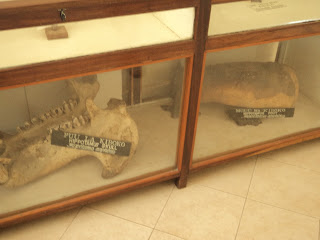 |
| other hippo leg. |
 |
| ostrich leg |
 |
| eland and zebra legs made into lamps |
 |
| elephant feet made into stools |
Then we took a fourteen hour bus ride home. Fin.
Labels:
travel
Voyage of the Peace Corps: Volunteers in the Mist
The next part of our journey was into the cold cold southwest mountains, to Bwindi Impenetrable Forest National Park, home of mountain gorillas, a forest of cold and dense greenery.
We also still had bread, though the peanut butter had been lost to larcenous monkeys in the midst of the Nile, so we began rigging monkey traps with the bread. We never caught one.
Now I will to a certain extent simply accept overpriced food and drink. However, what I do not accept is the way that the gorilla tracking is conducted. The price for a permit to look at gorillas is almost $500. The guides will do their best to convince people that they should hire porters for an additional US $15 (or maybe $25? I don't remember), on the grounds that people might be hiking up steep, wet mountains all day, and are still not guaranteed to find gorillas. Guides do this knowing full well where the gorillas are. The families that get tracked are well tracked, their normal habits plotted on maps, and they move up to 1 km a day. At this particular time of the year, the gorillas hang out around the camp. The first day they were in a tea field next to the camp, the next day they were on the path to the toilets at the camp. Those who paid the $500 were paying it to walk about 100 feet from their cabins. I have never been so glad at deciding to be cheap and not go gorilla tracking. I slept in, had a leisurely tea in the village and did the Peace Corps thing where I get people to teach me tribal greetings and on the return to my cabin, I saw gorillas in the tea fields. I regard this as defrauding the government of the money they were trying to scam from me.
Were I to run this camp, assuming ethics, I would try to make it into a really nice resort place, along the lines of a swanky hotel in a nice town. With options on the menu that, while somewhat overpriced, aren't discouragingly overpriced, and try to encourage people to just hang out for several days, eating and drinking, on the grounds that seeing the gorillas seems highly likely if you just hang out for a while, and there are also many birds and monkeys and just a beautiful forest to go hiking in, though the government still charges $15 just to walk in the national forest and that can't be helped. The camp we stayed at at the Nile made lots of money off us for food just because the prices weren't so outrageous and the food was good enough we still paid, and we were happy to spend long periods of time in their restaurant looking at the river below us. Of course, as many people as show up willing and having paid the $500 and easily persuadable to pay for porters there is absolutely no reason for this camp to start a vaguely moral business model, so I don't expect them to.
The rest of the party, after going on their arduous 100 foot gorilla track while I was still in bed, went on a nature hike. I include their pictures. While I did see gorillas in the tea fields and the next day by the bathrooms, I didn't take pictures.
All the stuff immediately outside the camp was, of course, touristy. I have never seen so many hand-carved gorilla walking sticks in my life. There was also a children's dance and theater group. Not particularly good or interesting, but it was a project founded to get begging kids off the streets and get them some sort of education. We donated and watched them perform a little. It was very gorilla themed, but included odd Christian songs informing us, contrary to our pop culture education, that the king of the jungle is "Jesus!" which is startling to hear when you are fully expecting Tarzan.
The voyage was fraught with peril from the moment we entered the bus. The driver was drunk. Not the normal, sucking down a packet of konyagi (the local, terrible terrible gin. It comes in individual plastic packets.) or chewing on a bit of murungi (some sort of illegal substance, I believe it's a plant related to the alkaloids, caffeine, cocaine, and nicotine, an one periodically sees bus drivers chewing them) high, but a man with a carton of "juice" that mysteriously was refilled at every stop, and at every stop, the hairpin turns up the mountain became more wild until we were catching air. The journey ended prematurely at a washed out bridge. Buses could not pass from one side to the other and waited one either side of the muddy impassable area of the road, while passengers trudged the 2km from one bus to the other. Our party located a passing safari land rover containing tourists in what can only be described as safari chic. They were too good to let us in their car, but they did let us stand on their running boards and hold onto their luggage rack all the way to the next bus. They also took pictures of us hanging off their car. Why, I do not know.
At long last we reached Bwindi Impenetrable National Forest, site of a huge government scam to bilk innocent tourists of their money. First, the only food at the camp site was a flat $15 regardless, and the only cafe right outside the camp charged almost 8k Ugandan shillings for a plate of rice and meat, and was out of beans and vegetables, and running out of rice. To put this into perspective, a typical local meal should be about half that price and it should be rice, beans, and vegetables plus a meat. Fortunately, we had crackers, oreo filling in a squeeze tube courtesy of nice people in the US who love us, and peanuts are always cheap. When those ran out, there was a village about 20 minutes down the road where we could get reasonable food at a fair price.
 |
| monkey trap! |
Now I will to a certain extent simply accept overpriced food and drink. However, what I do not accept is the way that the gorilla tracking is conducted. The price for a permit to look at gorillas is almost $500. The guides will do their best to convince people that they should hire porters for an additional US $15 (or maybe $25? I don't remember), on the grounds that people might be hiking up steep, wet mountains all day, and are still not guaranteed to find gorillas. Guides do this knowing full well where the gorillas are. The families that get tracked are well tracked, their normal habits plotted on maps, and they move up to 1 km a day. At this particular time of the year, the gorillas hang out around the camp. The first day they were in a tea field next to the camp, the next day they were on the path to the toilets at the camp. Those who paid the $500 were paying it to walk about 100 feet from their cabins. I have never been so glad at deciding to be cheap and not go gorilla tracking. I slept in, had a leisurely tea in the village and did the Peace Corps thing where I get people to teach me tribal greetings and on the return to my cabin, I saw gorillas in the tea fields. I regard this as defrauding the government of the money they were trying to scam from me.
Were I to run this camp, assuming ethics, I would try to make it into a really nice resort place, along the lines of a swanky hotel in a nice town. With options on the menu that, while somewhat overpriced, aren't discouragingly overpriced, and try to encourage people to just hang out for several days, eating and drinking, on the grounds that seeing the gorillas seems highly likely if you just hang out for a while, and there are also many birds and monkeys and just a beautiful forest to go hiking in, though the government still charges $15 just to walk in the national forest and that can't be helped. The camp we stayed at at the Nile made lots of money off us for food just because the prices weren't so outrageous and the food was good enough we still paid, and we were happy to spend long periods of time in their restaurant looking at the river below us. Of course, as many people as show up willing and having paid the $500 and easily persuadable to pay for porters there is absolutely no reason for this camp to start a vaguely moral business model, so I don't expect them to.
The rest of the party, after going on their arduous 100 foot gorilla track while I was still in bed, went on a nature hike. I include their pictures. While I did see gorillas in the tea fields and the next day by the bathrooms, I didn't take pictures.
All the stuff immediately outside the camp was, of course, touristy. I have never seen so many hand-carved gorilla walking sticks in my life. There was also a children's dance and theater group. Not particularly good or interesting, but it was a project founded to get begging kids off the streets and get them some sort of education. We donated and watched them perform a little. It was very gorilla themed, but included odd Christian songs informing us, contrary to our pop culture education, that the king of the jungle is "Jesus!" which is startling to hear when you are fully expecting Tarzan.
Labels:
travel
Voyage of the Peace Corps: Uganda, the Pearl of Africa
It was a Sunday,
early morning in Port Bell, one of Kampala's harbors. We were trapped, fugitive in a city
where no immigrations officials work on a Sunday to receive our
documents for legal entry into the country. But in this port, no one
cared. In so far as we could understand their speech. They spoke English, but it was a strange and almost incomprehensible sort of English. And it was a shady place, this Kampala. Some would call
it progressive. Or sinful. Full of signs advising against child
marriage, and citing grim statistics on maternal mortality. Also, a
place of modern decadence, sporting crosswalks in which people actually stopped for crossing pedestrians, public transport in which there was only one person to a seat, and other affections of capitalist running dogs.
In all seriousness,
I was totally impressed with the progressive educative billboards of
Kampala. So sure, all the beer advertisements were things like "here's to the men who make a difference!" but that's not actually
any worse than some things in the US, and there were billboard messages of “Would
you want your daughter married before 18? Don't do it to someone
else's daughter.” And “16 women die every year [or was it month? 16/yr seems really low] giving birth.” Also, some of guest houses
just come with a bunch of condoms under the mattress, which makes
sense since I've heard that one of the reasons Uganda has one of the
lower HIV/AIDS prevalence rates in Africa, despite being most
probably the birthplace of the disease, is due to their efforts to
educate the sex workers. So overall, good on them! It came across
as a much more progressive place than Tanzania. Plus, women showed their knees! It was liberating.
Finally, however, we received passport stamps, finally, we reached Jinja, the source of the Nile river, and we swam in the Nile's surprisingly warm waters.
Finally, however, we received passport stamps, finally, we reached Jinja, the source of the Nile river, and we swam in the Nile's surprisingly warm waters.
 |
| Statue of Gandhi, because his ashes were scattered into the Nile. |
 |
| The ubiquitous cormorants |
 |
| Fish eagles! |
We were there to test our strength against the surging white waves of the Nile, where it pours through class 5 rapids on its way out of Lake Victoria.
When we finally crawled from the river, bruised and sunburned, we rested on Hairy Lemon Island, in the midst of the Nile. A camp operated by an old man from South Africa, a brute of a man who performed bench presses with a log.
 |
| Can you spot the green mamba? |
 |
| Our cabin. A monkey broke in and stole our peanut butter |
 |
| Why is our life so difficult?? |
Labels:
travel
Subscribe to:
Posts (Atom)
